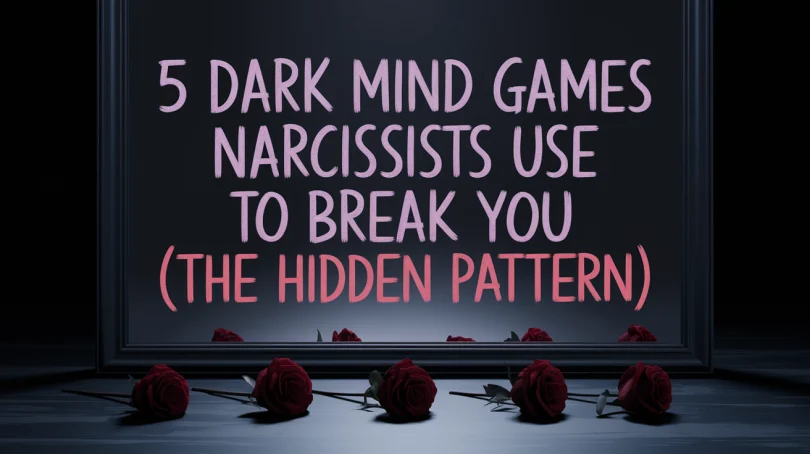Have you ever felt like the reality you know keeps shifting under your feet? Today, you’ll discover five powerful mind games that narcissists use to control others. Before we dive in, here’s what you’re about to learn:
- We’ll explore five sophisticated psychological tactics that narcissists use to maintain control.
- You’ll discover how to spot each one, understand why it works, and learn how to protect yourself.
- Whether you’re dealing with a narcissistic partner, family member, or colleague, this knowledge will help you maintain your sanity and set healthy boundaries.
1. Gaslighting: Making You Question Your Reality
Let’s dive into one of the most insidious mind games a narcissist plays: gaslighting. You know that gut feeling when something feels off, but someone you trust keeps telling you you’re wrong? That’s often where gaslighting begins.
Imagine this scenario: You clearly remember making plans with your partner for dinner at 7:00 p.m., but when they don’t show up until 9:00 p.m., they insist with absolute conviction that you agreed on 9:00 p.m. Not only that, but they remind you of how you’ve been so forgetful lately. That seed of doubt they’ve planted? That’s gaslighting in action.
Related Topics:
What is Future Faking & why do Narcissists do it?
8 Demonic Ways Narcissists Mess with Your Mind
Tactics NARCISSISTS Use To Confuse Conversations
Why this tactic is so devastatingly effective: Narcissists don’t start with big lies. They begin with tiny distortions of reality, small enough that questioning them makes you seem unreasonable. It might start with phrases like, “You’re too sensitive,” or “That’s not what happened at all.” They say these things with such confidence that you begin to question your memory.
Common phrases narcissists use during gaslighting:
- “You’re imagining things.”
- “I never said that.”
- “You must have dreamed it.”
- “You’re twisting my words again.”
They might even tell others you’re emotionally unstable or prone to exaggeration, creating a network of doubt around your credibility.
The psychological impact: This constant reality distortion creates a form of emotional dependency. When you can no longer trust your perceptions, you start relying on the narcissist to tell you what’s real. It’s like being in a house of mirrors where every reflection is slightly warped, and only they claim to know which one is true.
Remember: If you’re experiencing this, you’re not losing your mind. Your memories and perceptions are valid. Gaslighting works because good people don’t expect others to distort reality deliberately. Your willingness to consider that you might be wrong isn’t a weakness; it’s the quality that narcissists exploit. But now that you understand how this manipulation works, you’ve taken the first step toward reclaiming your reality.
2. The Idealize-Devalue-Discard Cycle
Now, let’s explore one of the most psychologically devastating patterns in narcissistic relationships: the idealize-devalue-discard cycle. Picture the most incredible romance you can imagine, where someone seems to understand you completely, shares all your dreams, and makes you feel incredible. That’s exactly how this cycle begins, and understanding it could save you years of emotional pain.
The cycle starts with what psychologists call “love bombing.” During this phase, the narcissist showers you with attention, affection, and what feels like pure, unconditional love. They’ll text you constantly, plan elaborate dates, and make you feel like you’ve finally found your soulmate. They might say things like, “I’ve never met anyone like you,” or “You understand me in a way no one else does.”
But watch carefully because the devaluation phase creeps in subtly. It often starts with small criticisms disguised as helpful suggestions: “You’d look so much better if you dressed differently,” or “Why can’t you be more like someone else?” The compliments that once flowed freely become rare and conditional. The person who once thought you were perfect now seems impossible to please.
Why does anyone stay in such a painful situation? The answer lies in something called intermittent reinforcement. Those occasional moments when the narcissist returns to their loving behavior create a powerful psychological addiction. You find yourself constantly working to get back to that magical beginning phase, convinced that if you just try hard enough, that perfect person will return.
Understanding this cycle is crucial because it helps you see that the initial idealization phase, as wonderful as it felt, wasn’t real love. It was a calculated first step in an emotional manipulation strategy. Real love grows steadily; it feels secure. It doesn’t swing wildly between adoration and contempt.
3. Triangulation: Creating Invisible Rivals
One of the most subtle yet powerful manipulation tactics in a narcissist’s arsenal is triangulation. If you’ve ever felt like an invisible third person was casting a shadow over your relationship, you’re not imagining it. That feeling is deliberate, and understanding it can completely change how you view relationship dynamics.
How triangulation works: A narcissist might casually mention how their ex still reaches out all the time or how a coworker keeps flirting with them. They give you just enough information to plant doubt but never enough to fully understand the situation. It’s like they’re dangling a mystery just out of reach.
Common triangulation tactics:
- Leaving their phone visible with mysterious notifications.
- They talk about how their ex still understands them better than anyone.
- Constantly mentioning how someone at work really “gets” their vision.
- Comparing you unfavorably to friends or family members.
- Bringing up people who are romantically interested in them.
- Keeping photos or mementos from past relationships in sight.
The psychological impact: Triangulation creates constant competition for the narcissist’s attention. Your sense of security erodes as you wonder whether you’re measuring up. You may try harder to prove your worth, walk on eggshells to keep them from seeking attention elsewhere, or feel like you’re in a never-ending competition.
Why it works so well: Triangulation exploits our instinct to fight for relationships. The narcissist knows that by creating competition, they can keep you engaged, working harder and harder to secure your place in their life. It’s like being in a race where the finish line keeps moving, and you’re running against shadows.
But once you recognize triangulation for what it is, you take back control. Real, healthy relationships don’t involve constant competition or mysterious third parties lurking in the background.
4. Intermittent Reinforcement: The Addiction Trap
Now, let’s dive into one of the most psychologically powerful tactics that narcissists use: intermittent reinforcement. Imagine sitting at a slot machine, watching the wheels spin. Sometimes you win, sometimes you lose, but you can’t stop pulling the lever. This same psychological mechanism traps people in toxic relationships—and understanding it could be your key to breaking free.
The science behind it: Intermittent reinforcement works because our brains crave unpredictability. When love, attention, or approval come at random intervals, our brains release more dopamine, the same neurotransmitter involved in gambling and addiction.
How narcissists use this against you: Narcissists time their affection with surgical precision. They pull away just enough to make you feel desperate. They give you hope just when you’re about to walk away. They surprise you with kindness, making you believe change is possible. Just when you’re about to give up, they remind you of the person you fell in love with.
Signs you’re stuck in the cycle:
- You feel intense relief when they show you affection.
- You constantly try to earn their love or approval.
- Good moments feel euphoric but never last.
- You replay their rare acts of kindness, hoping for more.
- You long for how things were in the beginning.
- You feel anxious even when things are good, waiting for the other shoe to drop.
Why it feels impossible to leave: Intermittent reinforcement creates a trauma bond, a deep psychological attachment formed through cycles of abuse and reward. The rare sweet moments become so precious that you’re willing to endure increasing amounts of pain just to experience them again. Your brain becomes addicted to the highs and lows of the relationship.
But here’s the empowering truth: Once you recognize the pattern, you can break free. Those magical moments? They’re not real love. They’re manufactured manipulations designed to keep you hooked.
5. Future Faking: Empty Promises & Control
Let’s explore one of the most deceptive tactics in the narcissist’s playbook: future faking. Have you ever wondered why someone would spend countless hours planning a dream future, only to never make it happen? The answer reveals a manipulation strategy so subtle that many victims don’t realize they’re caught in it until years have passed.
How future faking works: Future faking preys on your deepest hopes and dreams. The narcissist becomes an architect of fantasies, painting a detailed picture of the perfect life you’ll have together. “We’ll buy a beautiful house,” “Just wait until I get my promotion,” “We’ll get married after I sort out a few things,” “We’ll start a business together when the timing is right,” “We’ll have a family, but we need to wait for the perfect moment,” “We’ll travel the world someday.”
The psychological trap: Future faking is not just about lying; it’s about control. It keeps you focused on the future, so you ignore the present. It prevents you from making independent choices. It makes you invest time, energy, and emotions into something that doesn’t exist. Whenever you feel disappointed or ready to leave, the narcissist pulls out an even more immense promise: “Just hold on a little longer, things will change soon,” or “We’re so close to having the life we always wanted.” And so, you stay.
How it destroys your life plans: If you’re trapped in future faking, you might find yourself turning down career opportunities because they don’t fit “our shared vision,” putting off personal goals while waiting for their promises to happen, and missing out on real relationships. After all, you’re holding out for “someday,” losing your dreams as you invest in theirs, wasting years waiting for the right time that never comes.
Are they lying? Here’s the most dangerous part: Narcissists might not even realize they’re lying at the moment. They may genuinely believe their own words. But their promises are based on an idealized version of themselves that doesn’t exist. It’s like writing checks from an empty account; the intention feels real, but there’s nothing to back it up.
How to break free: The key to spotting future faking is looking for real action. Genuine plans have concrete steps, timelines, and consistent progress. The future faking lives in vague “someday” and never materializes. If someone’s promises never turn into action, it’s time to stop waiting.






